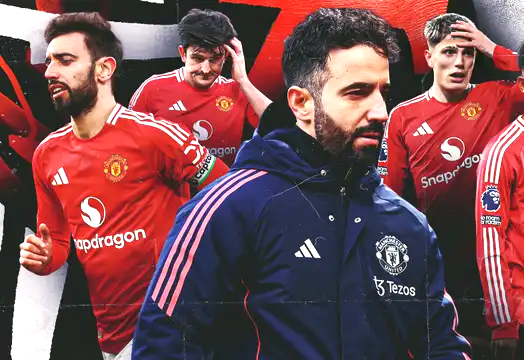
MANCHESTER UNITED: Manchester United have not improved under Ruben Amorim, but the Red Devils' manager must take lessons from Erik ten Hag's errors and stay dedicated to the process.
Under Ruben Amorim, Manchester United have yet to show progress, but the Red Devils' manager must draw insights from Erik ten Hag's mistakes and remain steadfast in following the process.
Ruben Amorim was in the middle of addressing questions about his decision to bench Marcus Rashford and discussing squad rotation when an unexpected interruption occurred—not from a journalist, but from a leaking ceiling in the Old Trafford press room. A lot has changed at Manchester United since Sir Jim Ratcliffe's £1.2 billion ($1.5 billion) investment a year ago. The training ground is undergoing renovations, plans for a new stadium have gained momentum, £160 million ($200 million) has been spent on new players, and over 250 staff members, including Sir Alex Ferguson, Erik ten Hag, and Dan Ashworth, have left the club. Yet, the team still suffers heavy defeats like the recent 3-0 loss to Bournemouth, Rashford's attitude continues to dominate headlines, and leaks in the stadium persist whenever it rains.
Amorim left sunny Lisbon and a dominant Sporting CP team to take on the chaos at United, sacrificing his Christmas to lead a struggling squad against Wolves on Boxing Day. The magnitude of the challenge he faces might make him question his decision, but Amorim is determined to stick to his plan. Although it may appear that United have not progressed since his arrival, Amorim has a clear vision for reviving the team, and it’s crucial that both he and the club remain committed to it.
Nine matches into Amorim’s tenure, the stats paint a grim picture. United sit 13th in the Premier League, only marginally better than when Ten Hag was dismissed in October. The team has secured seven points from six league games, one fewer than Ten Hag managed in his final six. They’ve exited the Carabao Cup—won under Ten Hag’s first season—and face a daunting FA Cup draw away to Arsenal. Defensively, United have conceded 17 goals under Amorim, with set-pieces proving a glaring weakness. Home defeats to Bournemouth and Nottingham Forest mirror similar results during Ten Hag's time.
Despite these setbacks, there are signs of progress. In the Europa League, United have positioned themselves to reach the last 16 without a playoff. A remarkable victory over Manchester City in the derby added a glimmer of hope, though Ten Hag also achieved similar results. Offensively, the team now averages 1.8 goals per game, up from 1.5 under Ten Hag, and looks slightly more cohesive in open play. However, set-piece defending remains a significant issue.
Amorim’s approach to injuries and squad rotation marks a stark contrast to his predecessor. While Ten Hag resisted rotation and frequently lamented the impact of injuries, Amorim actively rotates players to prevent long-term fitness issues, even at the expense of short-term performance. After making six changes for the Bournemouth game, Amorim explained his strategy, highlighting the balance between managing injuries and the pressure to deliver immediate results. His communication skills, both with the media and his players, further distinguish him from Ten Hag, who often failed to enforce discipline consistently.
Amorim has taken a firm stance on player accountability, benching Rashford and Garnacho for the Manchester derby due to off-field concerns. Rashford’s continued exclusion has sparked debate, but Amorim’s insistence on visible improvement in training demonstrates his commitment to high standards. His detailed justification of the decision after the Bournemouth loss should resonate with fans frustrated by the lack of discipline under previous regimes.
The manager’s unwavering belief in his methods is evident. While Ten Hag abandoned some of his core principles early in his tenure, Amorim has pledged to stick to his vision. Drawing from his experience at Sporting CP, he remains confident in his structured approach, emphasizing long-term success over short-term compromises. However, implementing such a philosophy amidst a packed fixture schedule and limited training time is no small task. Striker Rasmus Hojlund admitted that adapting to Amorim’s system has been challenging, and further growing pains are likely as United face Wolves, Newcastle, Liverpool, and Arsenal in the coming weeks.
Amorim’s commitment to his plan and refusal to accept mediocrity set him apart. While the results have been disappointing so far, his confidence and determination offer hope for the future. Staring at the leaking ceiling after the Bournemouth defeat, Amorim appeared both burdened by the immense task ahead and resolute in his ability to fix it. "We cannot let this become normal," he said. "I know what to do."
Although the journey is fraught with difficulties, Amorim remains a man with a clear strategy. Unlike his predecessors, he seems intent on seeing it through—offering Manchester United a much-needed sense of direction amidst their turmoil.
Leave a comment
Your email address will not be published. Required fields are marked *


